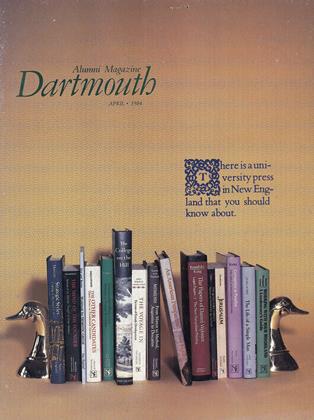PYRRHUS VENTURE
by Randolph Dominic '69 andWilliam David Barry.Atlantic-Little Brown, 1983.406 pp., $17.95.
I could begin: Here is a marvelous story in the spirit of Kenneth Roberts. It is a wide-sweeping tale of war and rebellion, intrigue and deceit; a seafaring yarn of vicious squalls and naval battles. Above all it gives an intimate glimpse into what constitutes true equality.
Or I could start: This narrative is a legacy to a grandson a book-length letter to William put down by Pyrrhus Venture, a cultured man of property, a scholarly man who has lived in Maine for nearly half a century, with a house on Clay Cove and a business in Portland.
Both beginnings are true, but each withholds two crucial pieces of information: The novel ends in 1816, and Pyrrhus Venture, then 65, is "... as black as a shadow on a summer's afternoon."
Pyrrhus, whose paternity is in doubt, grows up half ward, half servant, in the house of a fascinating Irishman, one Tiberius Fitzgore of St. Kitts. Because of Fitzgore's obsession with education and letters (he rails about Rousseau and corresponds with Samuel Johnson), Pyrrhus is given a classical education and tutored in trigonometry, Horace, Candide. His future seems assured.
Then deception, death, and greed come into his life and Pyrrhus is sold into slavery on Antigua. There his in- tellect impresses William Ross, captain of the Pretty Polly out of Falmouth in the Province of Maine, who buys him, and thus begins the first stage of his odyssey as a slave: "... Of Maine I knew next to nothing, except that it lay far to the northward and that it was uninhabited, save by Puritans and Indians, each as rude and savage as the other ..."
So this black man, through years of turmoil and insurrection, traces the birth of a nation; as a freedman he ponders the meaning of freedom. But while the scope of the story is vast from the West Indies to Bagaduce in Penobscot Bay; from Charleston, South Carolina to West Africa's Freetown the focal point is always Falmouth/ Portland. And as a chronicle of Colonial and Federalist Maine, and particularly of Portland, this novel is unsurpassed. For one who was brought up on Pond Cove four miles south, it is a revelation.
I went to school with Prebles, Soules, Emerys, and Freemans. Names. I walked Fore Street, Middle Street, Exchange and High. Just names. I learned Maine history in grade school: Portland was burned in some war; recite the cities Auburn, Augusta, Bangor, Bath...; Maine became a state in 1820 with the motto Dirigo. Who cared?
I do now. I see a living town. Famil- iar names walk familiar streets 200 years ago. The docks are crowded with traders and smugglers; schooners set sail loaded with masts for King George's Navy. Taverns are full and rum is flowing. But the Sons of Liberty are plotting. And some hundreds of days in the future the vengeful Englishman, Mowatt, will bombard the town with everything from grapeshot to cannon balls, and three-fourths of her will burn.
The authors have done meticulous research and their lovely prose is richer than Roberts's a stylized yet lilting, almost poetic, prose. Never once is there a jarring phrase. There are a number of nice ones. Learn why a ship's figurehead undergoes a startling change. Listen to a Gree-Gree man in Sierra Leone.
Blacks are part of Portland's heritage. A number were there in the 18th century, some as slaves and many already freed, owning homes, engaging in commerce, sailing the sea. Yet they were never mentioned in school and I never met one until I was 16. What happened to them? Why?
Maybe Dominic and Barry would clear up this puzzle by writing a sequel. The journal of William Benjamin Venture, perhaps?
Jean Kemeny grew up in Cape Elizabeth, Maine, less than a mile fromPortland Headlight. Her first novel, Strands of War, will be published byHoughton Mifflin in late summer 1984.
 View Full Issue
View Full Issue
More From This Issue
-
 Cover Story
Cover StoryConsortium
April 1984 By Shelby Grantham -
 Feature
FeatureHanover Sabbatical
April 1984 By Robert Conn '61 -
 Feature
FeatureCenters of Excellence and the Survival of Creativity
April 1984 By O. Ross Mclntyre '53 -
 Feature
FeatureRobert Frost Keeps Me Company Often Uninvited
April 1984 By Kenneth Andler '26 -
 Article
ArticleIt's Just Like Talking to People
April 1984 By Debbie Schupack '84 -
 Class Notes
Class Notes1959
April 1984 By William G. Long
Books
-
 Books
BooksAlumni Articles
APRIL 1970 -
 Books
BooksTHE LONDON STAGE 1600-1800, PART 4, 1747-1776.
JULY 1964 By HENRY B. WILLIAMS -
 Books
BooksPIERRE-SIMON BALLANCHE:
August 1946 By MARIE-LOUISE MICHAUD HALL -
 Books
BooksTEN APPLES UP ON TOP!
June 1961 By MAUDE D. FRENCH -
 Books
BooksTHE LIFE OF ALCIBIADES
FEBRUARY 1930 By Royal C. Nemiah -
 Books
BooksTHE COMPOSITION OF THE PSEUDOLUS OF PLAUTUS.
APRIL 1932 By Wm. Stuart Messer



